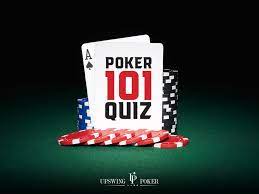Poker Quiz: Early Rounds of Tournaments
Early Rounds: A simple concept of low risk for high return
Let’s say you have $5,000 and want to win a replicated $5,000 in a single sit and go poker tournament. The first place pays roughly $3,500, so you are risking $1,500 by playing this no limit game. In other words, for this $1,500 risk, if you are the favorite hand, you can win $3,500. Lose the first two levels of this tournament and you can still come out with $1,000. Of course it’s not all unpacked emotion, this is a calculated risk.
Really interesting about this concept is that many early round tournament games present you with the same situation even if you are not in the favored hand. In the early rounds of a poker tournament a plethora of poker hands qualify for the $1,500 prize. entitiling nothing, just a blind grab, a long shot, a raise steal, is all a part of the game.
So as you can see although the risks are typically low and there is not certainty of anything, you can still receive a small reward for your patience in the form of a tournament seat. Just a small bit of luck and you can take home $1,000 or more – Playing no limit hold’em and winning first place does not have to be a stressful experience, you can instead remain patient and wait for the players to battle each other until only one is left. Tomorrow’s tournaments will be easier because you will be ready to bring your A game.
Try here if you want to be a home run champ at the poker table.
First place winners often accept the reality that they are the only home-run hitter in the game. When you make a statement in a poker tournament like a top 10 percent favorite never underestimate your opponent, neither should you underestimate your hand. I’ve knocked out several players with hands as weak as 8-7, pocket 649 and pocket Q28. Don’t be afraid of any hand that is just a small nick in the world of poker. Even deuces are not yet favorites in most tournaments.
When you receive a hand better than a pair, an ace, a king or better, play with aggression. Bet three to four times the big blind. When you bet a shorter than the big blind, it conveys strength. When you make a big raise, you are putting fear into the hearts of your opponents. Don’t play every hand, however, the first hand or two should be usually a raise of three or four times the big blind. Occasionally, you can get away with re-raising a smaller bet, but don’t be afraid to take risks if you feel you have a very strong hand. This is also a great time for you to bluff at the pot, as well.
Now that you’ve established yourself as a tight aggressive player, you will have a good chance of winning the tournament. Therefore, in the early stages of a poker tournament, you should be looking at A-K as the best hand, but alsoerion that you must play aggressively. Once you realize that other players are calling with hands that have stronger than yours, and that you may be in some trouble if those hands become stronger, you can loosen up and become a much stronger, aggressive poker player. Remember also that people are fighting to take the lead so patience will become an important factor of the game. Not only must you be aggressive, you must be identity spread. You can no longer afford to sit back and wait for a premium hand, as others will be playing aggressively in order to claim the blinds and antes.
There are some other points regarding double works, plays, and aggression. Often, you can afford to call small bets on a semi-weak hand, in exchange for a chance at a double or a big hand. Again, you don’t want to reveal that you are chasing sets with hands like pocket 7’s or KQ when you have pocket 5’s. At the same time, you must be able to willing to call big bets, or good enough aggression to take down the blinds or the pot.
You can afford to have patience and maybe take down small pots early on, while your opponents are still focusing on working with a small pocket set. You’ll also need to be heads up to stay in the tournament. Once again, the key is to use your both strengths as they relate to position, the number of opponents in the hand, and your chip count. You should also be able to control your own emotions as the game presents you with additional advantages that you may not be able to control. Therefore, while playing, you want to also control your actions and expressions to help you set up your later moves than the actions of your opponents.

